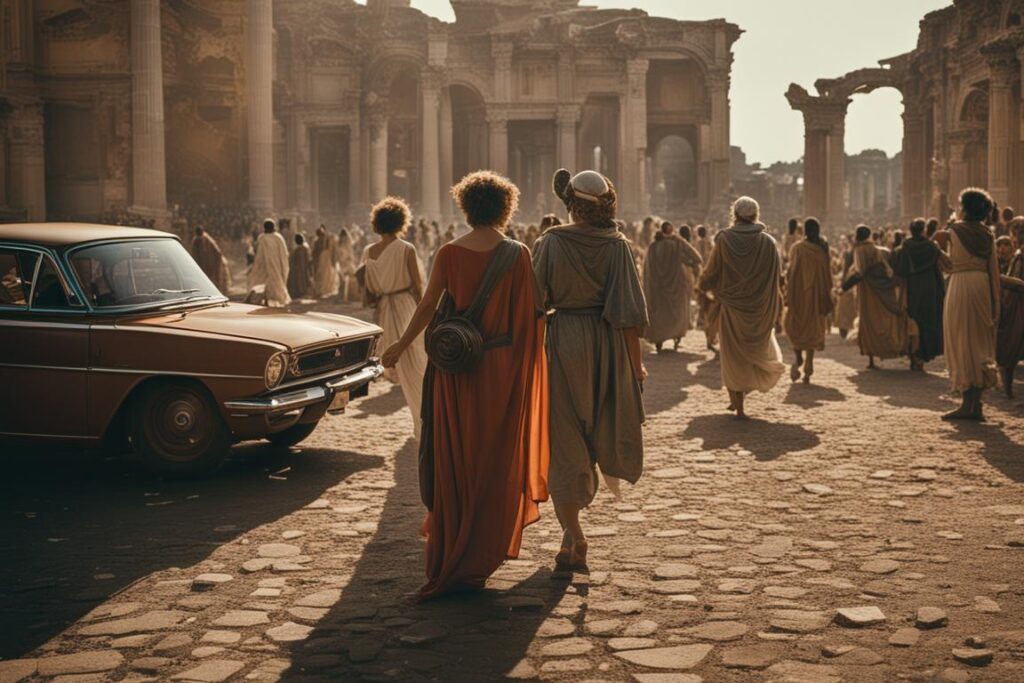
In the year 2045, after decades of theoretical research and experimental trials, scientists finally cracked the code to time travel. The breakthrough came from a collaboration between the world’s leading physicists and quantum theorists, who discovered how to create stable wormholes that could bridge different points in time. The announcement of this monumental achievement sent shockwaves across the globe, promising to revolutionize humanity’s understanding of history and the future.
The first practical time machine, the ChronoSphere, was unveiled at the United Nations headquarters. Resembling a sleek, transparent globe, the ChronoSphere could transport its occupants to any moment in history with pinpoint accuracy. The technology was immediately placed under the control of the International Time Travel Authority (ITTA), a newly formed global organization tasked with regulating the use of time travel to prevent potential abuses and paradoxes.

The initial uses of time travel focused on historical research and scientific exploration. Historians and archaeologists were among the first to benefit, traveling back to witness and document key events firsthand. The mysteries of ancient civilizations, such as the construction of the pyramids and the secrets of Stonehenge, were unraveled with unprecedented clarity. These journeys provided invaluable insights, reshaping our understanding of human history.
However, the power to traverse time also brought about significant challenges and ethical dilemmas. The potential for altering the past and creating paradoxes posed a constant threat. To mitigate these risks, the ITTA established strict protocols for time travel missions. Travelers were forbidden from interacting with historical figures or altering events in any way. Missions were closely monitored, and any deviation from the plan was met with severe consequences.
Despite these precautions, rogue time travelers inevitably emerged. A black market for unauthorized time travel developed, with thrill-seekers and criminals seeking to exploit the past for personal gain. These illegal activities prompted the ITTA to form a specialized task force, the Temporal Enforcement Unit (TEU), to track down and apprehend time criminals. The TEU operated in secrecy, using advanced technology to detect and prevent unauthorized temporal activities.
The most infamous case involved a group of time thieves who attempted to steal priceless artifacts from ancient civilizations. Their actions not only endangered the integrity of history but also triggered a series of unintended consequences. The TEU, led by the determined Agent Sarah Lawson, pursued the criminals through various eras, from the bustling markets of ancient Rome to the court of King Louis XIV. The pursuit culminated in a dramatic showdown in the Wild West, where the TEU successfully apprehended the thieves and restored the stolen artifacts to their rightful places in time.
The existence of time travel also sparked profound philosophical debates and cultural shifts. Religions and belief systems were challenged by the new understanding of time and history. Some saw it as a divine gift, while others viewed it as a dangerous intrusion into the natural order. Time travel novels, movies, and art flourished, capturing the public’s imagination and exploring the myriad possibilities and consequences of temporal journeys.
As the technology matured, time travel began to influence the present and future in more subtle ways. Predictive analysis based on historical data allowed governments and organizations to make more informed decisions. Medical researchers used time travel to study the origins and progression of diseases, leading to breakthroughs in treatments and cures. Environmental scientists traveled to pristine eras to gather data on the Earth’s ecosystems before industrialization, helping to devise more effective conservation strategies.
However, the most significant impact of time travel was on human perspective. Witnessing the triumphs and tragedies of history firsthand fostered a deeper appreciation for the fragility and interconnectedness of human existence. It encouraged a sense of global unity and responsibility, as people realized that the actions of the past shaped the present and the choices of today would influence the future.

In response to this newfound awareness, a global movement for temporal responsibility emerged. Educational programs emphasized the importance of preserving history and making thoughtful, informed decisions. The ITTA launched initiatives to educate the public about the ethical use of time travel and the potential risks of altering the timeline. These efforts fostered a culture of respect for history and a commitment to safeguarding the integrity of the temporal continuum.
As humanity embraced the possibilities and responsibilities of time travel, it became a tool for progress and enlightenment rather than a source of chaos. The ChronoSphere and similar technologies were used to learn from the past, address present challenges, and build a better future. In this world, the ability to travel through time not only expanded the horizons of human knowledge but also instilled a sense of stewardship for the delicate tapestry of history, ensuring that the mistakes of the past were not repeated and that the legacy of humanity endured for generations to come.




